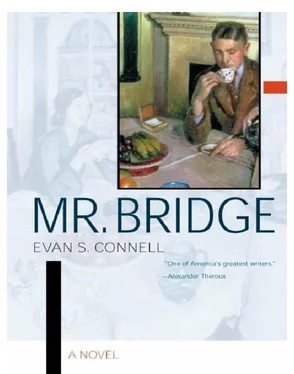Mr. Bridge could not attend the presentation ceremony because he was again spending Saturday at the office, but everybody else went to the grocery store — Mrs. Bridge, Harriet, and all three children. Mr. Denny himself was there. He looked rather like the leader of an orchestra. He was a slender young man wearing two-tone shoes, loose gray slacks with a sharp crease, and a British blazer with a gold crest on the pocket. Having shaken hands with everybody he asked them to call him Alfred, which nobody did.
After it was over and Carolyn had been photographed sitting tensely in the saddle, Jiggs was led back to his carrier and driven to the Waldo Stables, where Mr. Bridge had rented a stall.
Jiggs remained at the stables for several months. Then Mr. Bridge sold him to a farmer for thirty dollars. Carolyn had gone to visit her pony only twice. Ruth had gone out a number of times and come home nervous and excited, her clothing damp with perspiration, her eyes bright, and her long black hair undone, which displeased her mother. Douglas had not been to the stables at all. So it was that Jiggs did not have much to do and got fat eating oats. Mr. Bridge got tired of buying oats and the farmer wanted a pony for his children. Everything considered, it seemed sensible and perhaps inevitable that Jiggs should be sold. Carolyn was satisfied with her thirty dollars and not much more was said about it.
Once in a while something would remind them of Jiggs. They would wonder how he liked being on the farm, and they spoke of driving to Harrisonville some Sunday afternoon to say hello. But the Sundays slipped away and they never went.
Mr. Bridge often thought about the pony. The lively little creature reminded him of days he had almost forgotten, and it saddened him to realize he would not see Jiggs again — the cottony coat, the tossing head with its large metallic eye, the flecks of foam on the leather bridle — or hear again the imperious stamp of the tiny hooves.
Coming home late from the office one wintry Thursday he noticed the lights on in the dining room, which meant that the family was eating. After parking the Reo he let himself in the back door and stopped at the dining room. Douglas was not there.
Mrs. Bridge said he had been invited to have dinner with Bobby Tipton. Then she added, “I trust you have no objection.”
“No, I have no objection if he wishes to have dinner with one of his friends. How are the rest of you?”
“Just fine, as usual,” she responded, smiling at the girls. “They were simply famished, so we took the liberty of starting.”
Ruth said, “Daddy, what’s wrong?”
He looked down at her curiously. “What makes you think anything is wrong?”
She glanced at his briefcase and he realized that he was swinging it back and forth.
“Oh, dear, is something the matter?” Mrs. Bridge asked.
He walked into the hall, where he took off his gloves and his hat and coat and put them in the closet. Then he returned to the dining room.
“A youthful client of mine was awarded a certain sum of money for personal injuries this afternoon but the judge took it upon himself to reduce the amount.”
“Really?” she exclaimed. “Why, I had no idea they could do such a thing!”
“They can and they do. One thousand dollars is all that boy is going to get. One thousand dollars,” he repeated, and picking up a spoon he began to eat his soup.
“I sure could use a thousand dollars,” Carolyn said.
“It is far from adequate,” he answered shortly. He sighed and pushed the bowl of soup away.
“Was it snowing downtown?” Mrs. Bridge inquired.
“Of course it was snowing downtown. It snowed here, didn’t it? It snowed most of the day and the weather bureau predicts more of the same tomorrow.”
“I suppose getting around was a chore.”
“Getting around was next to impossible. I waited fifteen minutes for a cab. Good God, I thought I was never going to find a cab.”
“Do you have a headache?”
“I have had one since noon. How far is Douglas from here? Where does that Tipton boy live?”
“Oh, not far. Just the next block.”
“I don’t want him walking home alone in the middle of a snowstorm. He might get lost.”
Ruth said, “He won’t get lost. He knows where he lives. Stop worrying, Daddy.”
“Now you listen here, young lady: I am in no mood for an argument. I am the one who decides whether or not your brother is old enough to walk home by himself.” He had spoken more harshly than he intended. He pushed at the plate of lamb stew his wife set in front of him.
“If you want me to, I’ll walk over to Tipton’s and get him,” Ruth said.
“If those people invited him they should have had the decency to offer to bring him home.”
“I’m sure they will, if the snow starts again,” Mrs. Bridge said.
A few minutes later somebody knocked at the front door. Ruth answered it, and there stood Douglas accompanied by Mr. Tipton.
After the front door had been shut Mr. Bridge said, “Did they feed you enough? How about some dessert?”
Douglas said he didn’t think so, because he had eaten three pieces of chocolate pie at Tipton’s.
“You are tracking snow on the carpet, my young friend,” said his mother. “Go into the kitchen and take off your shoes.”
“Maybe later I’ll eat dessert,” Douglas said as he started for the kitchen.
“Pigs is pigs,” Carolyn remarked.
“We will have no more of that,” Mr. Bridge said, and after a moment he went on: “In fact, you may go to your room.”
Carolyn was startled. “What did I do?”
“You heard me.”
She turned to her mother, but Mrs. Bridge said, “You’d better obey your father. I’ll come see you in a little.”
“Daddy—” Ruth began.
“And you! Both of you. Right now. March.”
They looked at their mother, who shook her head helplessly. They got up and walked out of the dining room.
Mr. Bridge found himself very much alone at the opposite end of the table from his wife. He had not wanted this. He had been looking forward to a comfortable evening with his family. Now it was ruined. He began drumming his fingers on the table.
She asked if he would care for anything else, and he searched her voice. But she was not sarcastic. In all the time he had known her she had not once used herself that way.
“No. No, I can’t eat tonight. Take some dessert to the girls when you go to see them. That business in court has thrown my whole day off.”
“I do think you’re overworking,” she remarked. “Why don’t you take up a hobby? Other men do. Virgil has quite a stamp collection, you know.”
He went on as though she had not spoken: “I represented a boy who suffered irreparable injury because of negligence on the part of his employer. That boy will never again lead a normal life. The compensation was not unreasonable. So far as that goes, to my mind it is difficult to contemplate any sum which might be called ‘unreasonable’ after somebody’s life has been virtually destroyed. Be that as it may, the jury agreed that the sum requested was not unfair. This amount, however, was deemed excessive and reduced to the point of mockery by a judge who is totally incompetent. That boy, incidentally, is not quite nineteen years old, so he may anticipate a good many more years in his present condition.”
“It’s a shame. The judge should have realized.”
“The judge did not realize because he happens to be a fool.”
“Can’t anything be done?”
“I intend to appeal the judgment. However, what this means is more work for me, and I am not taking a fee for this case. What an appeal means is that I must invest more time and effort in a charity situation. I already have spent more time on it than I can afford to.”
Читать дальше












